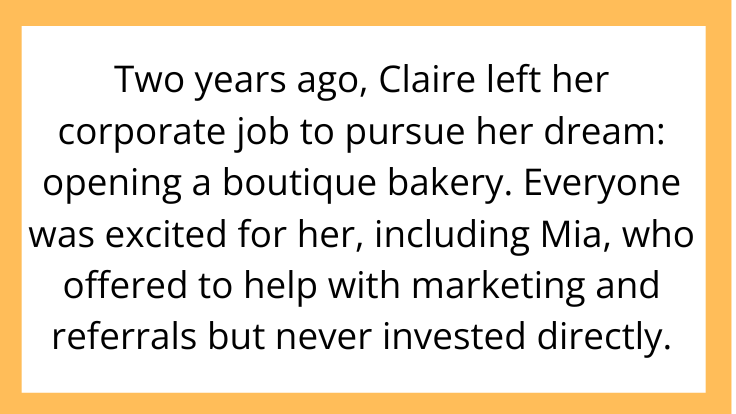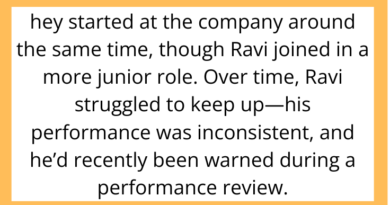AITAH for Refusing to Loan My Best Friend Money After Her Business Failed?
Money and friendship are a messy combination. No matter how strong the bond, financial stress can turn trust into resentment overnight. In today’s AITAH scenario, a woman is questioning whether she’s heartless—or just being responsible—for saying no when her closest friend needed a loan.
Here’s how it all unfolded.
The Backstory: A Friendship Spanning Decades

The original poster—let’s call her Mia—shared her story on Reddit’s r/AITAH forum. She and her best friend, Claire, have been inseparable since high school. They were roommates in college, served as each other’s bridesmaids, and have supported each other through countless milestones.
Two years ago, Claire left her corporate job to pursue her dream: opening a boutique bakery. Everyone was excited for her, including Mia, who offered to help with marketing and referrals but never invested directly.
Unfortunately, the bakery struggled almost from the start. Rising rents, high ingredient costs, and slow foot traffic chipped away at Claire’s finances until she had to close her doors for good.
Now, Claire was facing a mountain of debt—and she turned to Mia for help.
The Request: A Loan That Felt Like Too Much

Claire asked Mia to lend her $20,000—enough, she said, to cover her remaining debts and help her “reset.” She promised she would pay it back within two years.
Mia was taken aback. While she does have a stable income and some savings, she had been working for years to build her emergency fund and had her own financial goals: buying a home, starting a family, and retiring early.
When Mia gently declined, Claire was shocked.
“You’re my best friend,” she said. “If the roles were reversed, I would never hesitate to help you.”
Claire accused Mia of being selfish and uncaring. Other friends in their circle began to take sides, with some saying Mia should have stepped up to help “when it mattered most.”
The Debate: When Does Loyalty Cross the Line?

Why Mia Might Not Be the Villain
-
Financial Boundaries Matter
Lending money can create a power imbalance and strain even the strongest friendships. Many financial experts advise against loaning large sums to friends without clear contracts—and even then, it’s risky. -
Not Her Responsibility
Mia wasn’t a business partner. She supported Claire emotionally and practically but never signed up to be her financial safety net. -
Long-Term Consequences
If Claire couldn’t repay the loan, the fallout could destroy their friendship permanently.
One Reddit commenter put it simply:
“You’re not a bank. She made a choice to take on this risk. It’s sad, but it’s not your burden to carry.”
Why Some Think Mia Should Have Helped
-
Years of Support and Closeness
Their friendship wasn’t casual. They were more like family. Some feel that in such a close bond, you show up when it really counts. -
Potential for Recovery
With help, Claire could have gotten back on her feet faster. A loan might have been the difference between starting over and financial ruin.
But even sympathetic voices agreed that Claire’s reaction—guilt-tripping, shaming, and enlisting others to pressure Mia—was out of line.
The Bigger Lesson: You Don’t Owe What You Can’t Afford to Give

This AITAH story resonates because it exposes an uncomfortable truth: sometimes, the people we love the most expect us to go beyond what we’re comfortable giving.
Saying “no” doesn’t mean you don’t care—it means you’re aware of your own limits.
Mia’s choice was about protecting her own security, not about abandoning Claire. The situation was tragic, but it wasn’t her duty to fix it.
What Could Mia Have Done Differently?

Some Redditors suggested compromise:
-
Offering a smaller amount she was comfortable parting with, as a gift rather than a loan.
-
Helping Claire set up a GoFundMe to rally community support.
-
Assisting with budgeting, job applications, or credit counseling.
Still, none of these alternatives would have guaranteed Claire’s approval. Sometimes, no matter how much you care, you can’t meet someone’s expectations—and that’s okay.
Takeaway: Boundaries Are Not Betrayals

Mia wasn’t rejecting her friend. She was rejecting a financial commitment she couldn’t make in good conscience.
This AITAH story is a powerful reminder that:
-
Lending money to friends or family should always be considered carefully.
-
Emotional ties don’t erase financial realities.
-
No one should be pressured or shamed into giving beyond their means.
If your friendship is real, it will survive honest boundaries.



